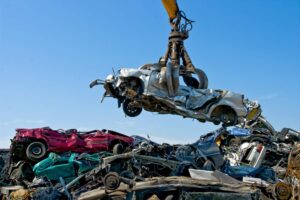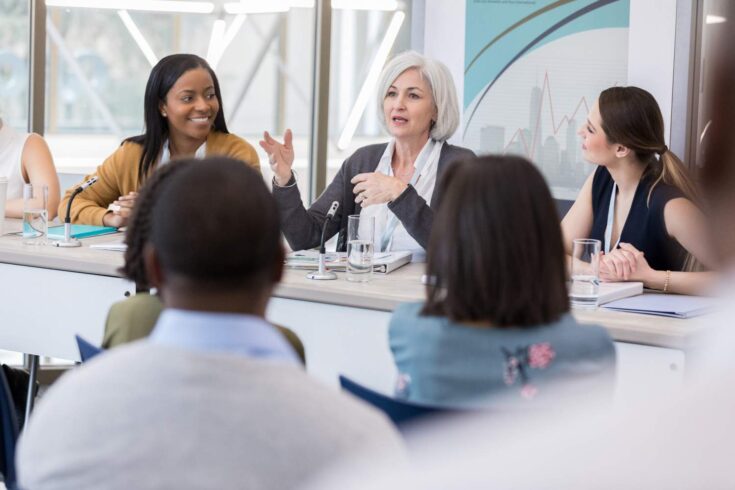This candid conversation between industry leaders was hosted by Hallam Wheatley, Co-chair of the Future Leaders Group. It allowed a glimpse into some of the challenges faced by foundation industries (FIs) but the huge array of opportunities if we act now.
Members of the Future Leaders Group posed questions to the panel, comprising:
- Emily Landsborough, Sustainability Advisor at Ibstock Brick
- Eoin Bailey, UK Innovation Manager at Celsa Steel UK
- Geoff Mackey, Corporate Affairs and Sustainability Director at Baden Aniline and Soda Factory
- Rob Ireson, Innovation and Partnerships Manager at Glass Futures.
To start the discussions, the future leaders asked the panelists what sustainability means to them.
Emily kicked off by saying:
We need to prioritise people and planet before profit.
This ensures the work that the FIs do has a positive impact upon society.
Enhanced quality of life
Geoff echoed, this means:
Providing a viable future for an enhanced quality of life with responsible use of technologies.
Net zero commitments must be built into targets and we must look for solutions to decouple resource consumption from growth.
He added:
It’s about making the right choices and with enough understanding to make the right choices, science literacy and carbon literacy are key. People are currently making choices without having all of the information.
Rob continued, by stating:
We need to influence society, by changing recycling habits, we can massively increase the availability of recycled glass. How do we challenge the way society thinks and acts to maximise the impact of sustainability measures?
Eoin’s views aligned and he states:
Sustainability must mean circularity. We can’t have a future that is sustainable and prosperous without a circular system.
To come back to Emily’s point, it needs to be profitable for businesses to change. But the happy co-incidence of circularity is that you build value into society and reduce the cost of being a polluter.
Part of a circular economy
But we still don’t know enough as industries about what we can or should do.
If we decarbonise what we currently have, we just make more products, albeit those that enable a green society such as wind turbines and electric vehicles.
For full sustainability we need to understand the whole life cycle of the full system and only produce the products that we need and can be part of a circular economy.

Credit: Parradee Kietsirikul, iStock, Getty Images Plus via Getty Images
Educating people
Other panelists echoed the circularity piece.
They stated:
The circularity piece is crucial. A lot of the FI products that we make last such a long time that we haven’t had to think about end of life previously. But now, we need to look at the world differently.
One thing we can all agree on: we can’t carry on like this. We must think about systems, how things work and why do we have them. We need to educate people that they can’t recycle a few pieces at home and then go on a plane for a holiday!
We can’t just blame the consumer, industry must take leadership to provide better choices for people. And a large part of decarbonisation must include pushing the markets in the right direction.
Everything we do as a western society is dedicated to point of sale. Industry is addicted to profit, addicted to selling more. We’ve done this for so long, it’s how we’ve been educated. Volume sales are the only way to make profit and have prosperity. Only concentrate on point of sale.
We need to educate everybody about the value in the wider system, outside of point of sale, to enable FIs to deliver solutions.
To achieve this, FIs need to engage and integrate the supply chains above us, to guide customers through what options are available and where innovation is required.
Contractors and subcontractors are starting to be directed, for example, by property developers and designers and FIs can guide what the solutions could be.
The key is understanding how materials can be best used, which is knowledge the FIs hold.
But other parts of the ecosystem come into play too. All members agreed it was crazy to think we still demolish buildings when we can design for disassembly and remanufacture.

Credit: JARAMA, iStock, Getty Images Plus via Getty Images
Key to sustainability
The panelists said:
FIs can provide materials as a service, this is where real benefit can be shown. If we lease at a molecular level, providing a service as a system, FIs have an economically viable business model and are the key to sustainability.
When asked about the key barriers to achieving sustainability, the group agreed that economic barriers were still large.
They continued:
The heart and desire are there across all of the FIs but how do you make it affordable at the research level, and how do we get those technologies into industry?
Initiatives such as the Transforming Foundation Industries challenge have been fantastic in terms of getting some of these issues at the forefront and getting to the foundation industries to begin working together and catalysing research.
But these advances do come at an upfront cost.
Sharing costs and values
They added:
Technologies that improve sustainability may well be more expensive to run in the short term but how can costs be shared across the supply chain.
End users, big brands such as Diageo and Heineken are now thinking about how they can make their supply chains more sustainable, sharing costs and value.
The key with supply chains is having a conversation. Don’t assume they’re not interested. Spend some time with the entire supply chain.
We must not assume that innovation depends entirely on technology or huge amounts of money. Often the biggest catalysts for change are based upon tiny system changes.
These are challenges to think through as FIs together. How can we really start to align supply chains, especially in data and material tracing, embedding information to track history and environmental information? How do we best inform decision makers, for example architects and designers as a collective, without pulling them in different directions to suit each FI’s agenda?
This is the only way we will achieve overall carbon negative materials solutions, for example for building sustainable buildings.
Utilising data effectively
They noted:
We have lots of data already, but we don’t utilise it effectively.
For example, the automotive industry has a lot of data: what materials are found in the car, what components are they located in, but they’re not utilised to find the value in the cars.
At the end of life, cars are crushed, shredded and all materials mixed up, only able to be used in low value applications.

Credit: hroe, iStock, Getty Images Plus via Getty Images
Science and metrics based
So what must change?
They said:
When it comes to decision making, it must be science and metrics based. It’s not a conversation, it has a clear answer, we just need the data to show it. People are currently making decisions without all of the information.
But having science-based targets doesn’t mean we shouldn’t question the science. We need to question: are protocols set up to accurately represent a circular system? Scope three emissions aren’t well understood under the linear economy, and this must change.
Also, in the current system, there is nothing to reward those working in a circular manner. We need to understand how science-based targets can facilitate circular economy.
Ultimately, there are policy needs.
Thinking about value
The panelists commented:
Policy is not fit for purpose for a sustainable prosperous future. It’s lagging behind and trying to solve the problems with the same mindset that created them in the first place.
We need to think about value: how do we measure environmental impacts and have clear standards to enable consumers to make the right choices? Policy can also stimulate more rapid societal change, alongside a push from the FIs to encourage their customers to drive change.
Clear, consistent, policies are required to give stability to decision making.
There is a role for local councils and regions to jointly invest in innovation to lead to shared prosperity with industry. There is the opportunity to really shape change.
This can include outreach into:
- education
- job creation
- growth
- international investment.
Sustainability is an opportunity not just a challenge.
Bold ambitions
To wrap up, the future leaders posed: in a perfect world, what would you like to see your sector look like in a sustainability perspective?
The use of green fuels, achieving a full circular economy, no reliance upon virgin materials were all echoed across the group: eliminating the impact of processing upon the environment.
Beyond that, they also voiced bolder ambitions to:
- have a positive impact upon the environment (by absorbing carbon through products or plants)
- create products that enable sustainability across society, for example:
- sustainable buildings
- electric vehicles
- more efficient renewable energy and more.
They stated:
United Nations goals exist because the linear economy has created a need for them. They’re there to quantify the impact of the linear economy. If the world was truly circular and integrated, we wouldn’t need those goals.
This isn’t about a single company but about society and a system solution.
But in a wider sense, this is all about people.
Inclusive world
They also stated:
We want to see people wanting to join the industry, where talent supply outstrips demand for jobs.
An inclusive world, ultimately, from which future solutions will come much quicker.
Engaged, diverse and inclusive audiences and stakeholder groups, to work on resource efficiency, circularity, systemised and decarbonised models, and effective climate protection.
People are the key decision making process in all systems, we need to make every decision within planetary boundaries to give equality for everyone.
We need to:
- overcome preconceptions and perceptions of the manufacturing industry
- show students how exciting these industries are
- attract diverse talent by engaging with communities and families
- provide diverse role models
- show the true value of the FIs and careers within them.
Working with education providers
We have a responsibility to educate society on where products come from and how to be a responsible consumer.
And we have a responsibility to work with education providers to overcome the siloed school curriculum and embed whole systems and societal thinking at a young age.
They added:
There are so many things to be planned, managed and taken forward, but ultimately we need better understanding of where the FIs sit in this future society and to clearly communicate this message to the wider world.
Check out the full recording of the sustainability for the FIs webinar on YouTube and get in touch with the Future Leaders Group with any thoughts via email tfi.flg@iuk.ukri.org or using #TFI_FLG on Twitter.
Top image: Credit: SDI Productions, iStock, Getty Images Plus via Getty Images




